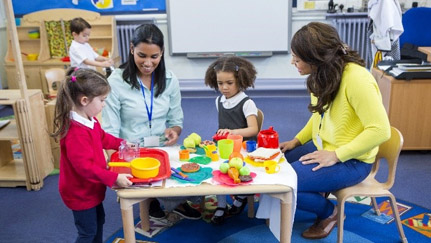Temporary child daycare: Senior living

Keep your senior living community residents, employees, and children safe during the COVID-19 pandemic.
To meet the childcare needs of senior living community employees during this pandemic, some communities are exploring the idea of providing temporary onsite child daycare to on-duty staff. Before taking on this endeavor, providers should consider precautions related to their services, facilities, children and residents in their care.
Keep in mind the essentials
Here’s the good news – your business is used to providing care for those in need. Many of the same precautions you take to protect your residents will carry over into providing care for your employees’ children. Here’s a few ideas to get things started and to make sure that other safety authorities are aware of your plans:
- Limit childcare services to employees only, and only for the hours when they are working for your facility.
- Take the same level of care for infection prevention and control policies, practices, and staff training as you do for your residents.
- Notify your local fire department of your intention to operate a temporary childcare facility.
Follow their life safety requirements specific to childcare facilities. Many of these will be similar to your senior living facility, such as clear exit paths, emergency plans and drills, etc.
- If childcare services will be provided by a third party, ensure you operate under a written contract and that the third-party provider has been vetted and is qualified to operate a childcare facility.
Set up your facility for safety and security
You probably didn’t consider that your senior living community would someday also operate a temporary childcare operation. That in mind, there are a few simple steps you can take to ensure your building meets the safety and security needs of all occupants, such as:
- When possible, provide childcare in a building separate, but nearby, the senior living facility.
- If you must use a space within the senior living building, choose one on the ground floor and as close as possible to a designated entrance. Doing so will reduce comingling of children and residents and enable easy drop-off and pick-up without passing through significant portions of the senior living community.
- Ensure that the childcare area has its own restroom facilities in or directly adjacent to the space.
- Create a layout that allows childcare providers to see all areas for continuous activity monitoring.
Running a successful temporary childcare facility
The day-to-day activities of your temporary childcare facility will somewhat resemble those of your senior living community. Follow these tips and you’ll be on your way to a successful childcare effort:
- If not already completed, administer comprehensive criminal background checks, including child abuse and sex offender registries, to all community employees who will work in the childcare area.
- Train all employees on child abuse recognition and prevention.
- Obtain and file each child’s medical, allergy, dietary, and parental contact information.
- Never leave children unattended. At least two childcare providers should always be on duty, with more required based on the number and needs of children in the facility and applicable state/local laws for temporary childcare services.
- Require that parents bring, retain, and administer any medications required by their children during daycare—even over-the-counter medications and supplements. Ensure that adequate infection prevention and control procedures and practices are in place for medication dispensing.
- Establish procedures for parents to physically sign children in and out of the facility. Since parent employees will be working at the community, they will be the person picking up and dropping off the child under most circumstances. Maintain an authorized pick-up list for each child in case the parent employee is not available.
- Refer to CDC and local regulatory guidelines for child daycares.
- Comply with all applicable federal, state and local laws, orders and regulations, including those related to COVID-19.
Maintaining high-quality, safe resident care
Although these times require special focus on the children in or near senior living facilities, resident care is still imperative. Ways to ensure that both populations – residents and children – can live safely in their daily environment include the following:
- Do not allow any activities to be conducted with both children and residents. Clear separation is key to the safety of both groups.
- Assign workers to either the child daycare or the senior living facility for their entire shift, but not both on the same day.
- Require parent employees to provide transportation to and from the center. Don’t conduct any transportation-related activities, as this introduces an entirely new set of risks and necessary precautions.
- If meals for the childcare will be provided by the senior living community kitchen, ensure infection control and food service sanitation plans are in place.
- Only child daycare staff, children, and parent employees should enter the daycare area. Parents should be allowed only for drop-off, pick-up, and to administer medication. Senior residents should not enter the child daycare area.
- Develop written steps that will be taken to protect children in the daycare program in the instance that a resident or staff person is discovered to have COVID-19.
Where to go for more information
